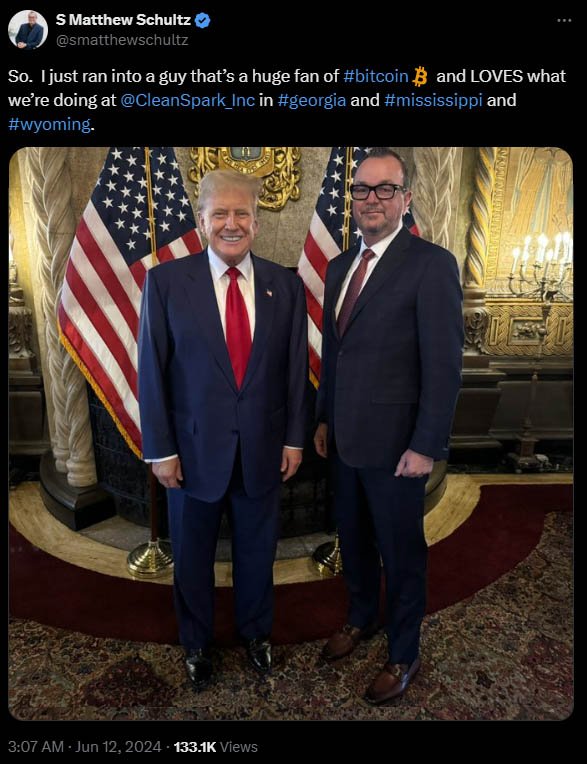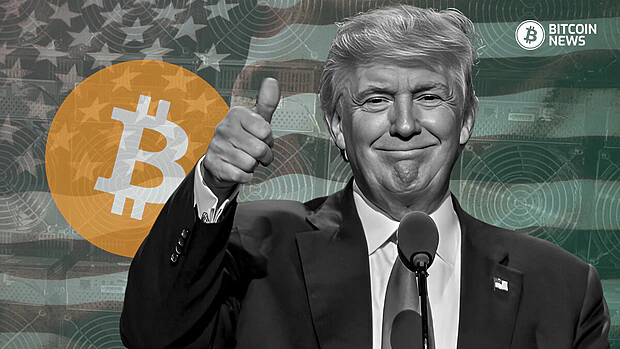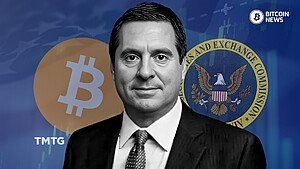In a series of remarkable developments, former President Donald Trump has emerged as a significant proponent of Bitcoin, a stance that contrasts sharply with his earlier skepticism.
This shift was prominently displayed during a recent meeting at his Mar-a-Lago residence, where Trump engaged with leading figures from the Bitcoin mining industry.
The gathering underscores his growing embrace of the Bitcoin world and its potential impact on the upcoming 2024 presidential election.
On a Tuesday evening, Donald Trump welcomed several top executives from the Bitcoin mining industry to his Mar-a-Lago residence.
Among those in attendance were representatives from major firms such as Marathon Digital, Riot Platforms, Terawulf, CleanSpark, Core Scientific, Arkon Energy, Cholla Energy, and Exacore.
These companies collectively represent a substantial portion of the Bitcoin network’s computing power.
Jayson Browder, a senior vice president at Marathon Digital, described the meeting as highly productive. “Trump was prepared and informed,” Browder remarked, highlighting the former president’s understanding of the complex issues surrounding Bitcoin mining and its intersection with energy policy.
One of the key themes Trump emphasized during the meeting was the potential role of Bitcoin mining in stabilizing the power grid.
This point was echoed by multiple attendees, including Matthew Schultz, executive chairman of CleanSpark Inc. Schultz quoted Trump as saying that Bitcoin miners help “to stabilize energy supply from the grid,” a perspective that aligns with the views of many in the Bitcoin industry.
Related: Bitcoin Mining, Clean Energy and Grid Balance
Schultz highlighted that Trump is keen on maintaining the U.S.’s dominance in Bitcoin mining and preventing China’s influence.
He expressed astonishment by Trump’s understanding of the Bitcoin mining industry and his personable interaction, noting Trump’s intelligence and lack of reliance on notes.
Schultz initially expected the meeting to be a campaign rally but found it to be more substantial and engaging. He later tweeted about Trump’s support for Bitcoin and CleanSpark Inc’s operations in Georgia, Mississippi, and Wyoming.

Chris Cook, president of Exacore, also met with Donald Trump and discussed retraining workers displaced from declining industries, like coal, to work in Bitcoin mining.
Cook highlighted that Bitcoin mining could create numerous ancillary jobs and potentially double U.S. power generation, which he estimates could boost GDP by 2-3% and create nearly a million jobs. He noted Trump’s awareness of the significant energy demands of AI.
Trump’s endorsement of Bitcoin mining as a stabilizing force for the energy grid comes at a time when the industry faces significant scrutiny over its energy consumption and environmental impact.
Critics, particularly within the Democratic Party, have raised concerns about the carbon footprint of Bitcoin mining operations. In response, Trump has positioned himself as a defender of the industry, advocating for its role in energy management and economic growth.
Trump’s newfound support for Bitcoin mining has significant political and environmental implications. Trump’s explicit endorsement of Bitcoin mining introduces another dimension to the continuing discussion on the viability and prospects of digital currencies.
This divergence in perspectives is likely to play a pivotal role in shaping the discourse around Bitcoin in the 2024 election.
Trump’s campaign has already begun accepting digital asset donations, signaling a deeper integration of digital assets into his political strategy. This move aims to attract a new demographic of voters who are invested in the future of digital currencies.
Brian Hughes, senior advisor to the Trump administration, said:
“crypto innovators and others in the technology sector are under attack from Biden and Democrats […] while Biden stifles innovation with more regulation and higher taxes, President Trump is ready to encourage American leadership in this and other emerging technologies.”
In a powerful endorsement on his social media platform, Truth Social, Trump highlighted Bitcoin’s potential as a defense against centralized digital currencies, which he views as a threat to American economic dominance.
He wrote, “Bitcoin mining may be our last line of defense against a CBDC. Biden’s hatred of Bitcoin only helps China, Russia, and the Radical Communist Left.”
Trump’s reference to a Central Bank Digital Currency (CBDC) touches on a broader debate about the future of money. While the Federal Reserve has not yet decided to pursue a CBDC, it has been exploring its potential benefits and risks.
Trump’s opposition to CBDCs aligns him with the Bitcoin community’s fear of increased government control over financial transactions.
Trump’s strategic embrace of Bitcoin and other digital assets is not just about economic policy; it’s also a savvy move to widen his voter base.
By positioning himself as a champion of the Bitcoin industry, Trump hopes to attract tech-savvy voters and those who are disillusioned with traditional financial systems.
During the Libertarian National Convention, Trump made a bold pledge to commute the sentence of Ross Ulbricht, the convicted founder of the Silk Road online marketplace, which further endeared him to the libertarian and Bitcoin communities.
Trump’s pro-Bitcoin stance has also caught the attention of financial analysts. Banking giant Standard Chartered has projected that if Trump returns to the White House, bitcoin could see a significant price surge, potentially reaching $150,000 by the end of the year.
This forecast underscores the potential market impact of Trump’s support for digital currencies.
As of now, bitcoin trades at around the $67,000 mark, experiencing slight fluctuations over recent days. The prospect of a Trump presidency is seen as a bullish signal for the Bitcoin market, given his advocacy for favorable policies towards the industry.
The meeting at Mar-a-Lago also highlighted the ongoing challenges and opportunities for Bitcoin mining in the U.S. Since China’s ban on Bitcoin mining in 2021, the U.S. has become the epicenter of this energy-intensive industry.
Democrats have been leading efforts to increase scrutiny on Bitcoin miners, with figures like Senator Elizabeth Warren calling for stricter regulations.
On the other hand, Trump and his allies, such as Texas Senator Ted Cruz, have positioned themselves as defenders of the industry, advocating for a balanced approach that recognizes the economic benefits of Bitcoin mining.
Related: Senator Ted Cruz Ventures into Bitcoin Mining in Texas
Central to Trump’s Bitcoin advocacy is his vision of American energy dominance. He believes that supporting Bitcoin mining could help the U.S. achieve this goal by making better use of excess energy and enhancing grid stability.
“We want all the remaining Bitcoin to be MADE IN THE USA! It will help us be ENERGY DOMINANT!” Trump proclaimed on Truth Social.
This vision is part of a broader strategy to counter foreign adversaries and reduce dependence on centralized financial systems. By promoting domestic Bitcoin mining, Trump aims to ensure that the U.S. remains at the forefront of technological innovation and economic leadership.
Donald Trump’s engagement with the Bitcoin mining industry marks a significant shift in the political landscape surrounding digital currencies.
His support for the sector not only highlights its potential role in energy management and economic growth but also positions it as a key issue in the upcoming presidential election.










